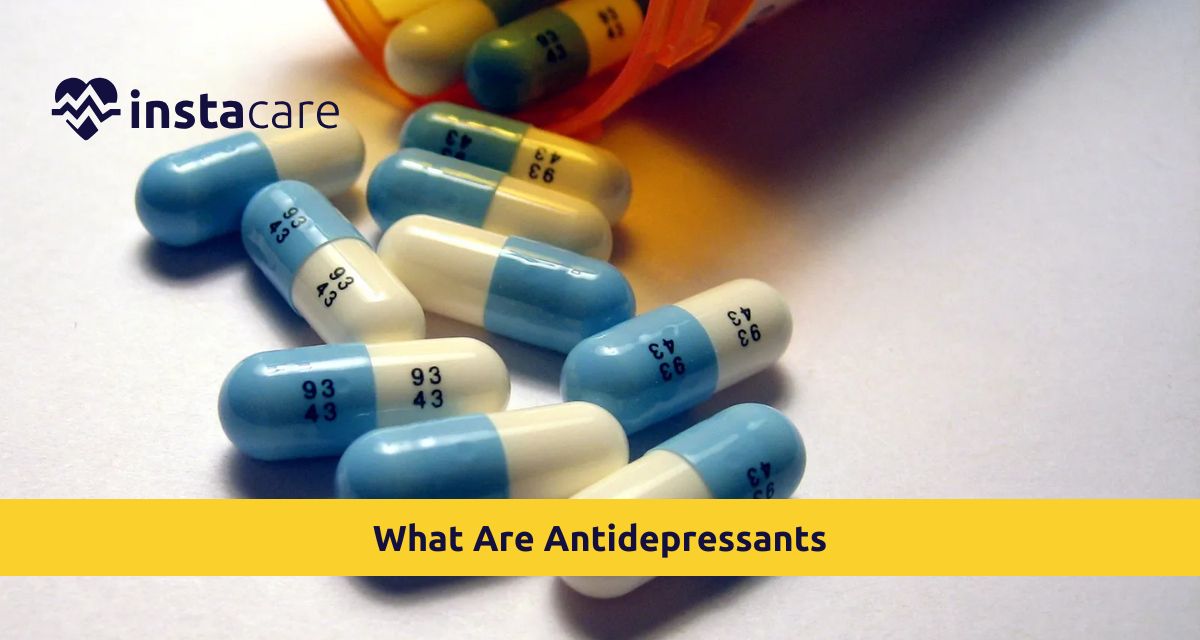Antidepressants are drugs taken specifically to reduce
manifestations of depression and, further, other disorders of mood. So far,
such drugs, undoubtedly, entered the treatment course of millions of people and
reduced their symptoms, perfecting the way of life. So let's look at what
antidepressants are, how they work, what types exist, what side effects occur,
and some important considerations for anybody in an age range or who sees a
need to take them.
What is Depression?
Depression is nothing but just unhappiness. Actually, depression is a much more serious mental disorder, whereby it encompasses such characteristics as being a continuing mood of sadness and hopelessness combined with a diminished interest or pleasure in social, occupational, or other activities that are usually experienced by an individual. The symptoms also vary a lot but may include:
- Emotional Symptoms
- Physical Symptoms
- Cognitive Symptoms
There are various causes of depression. In some cases, it is
caused by a person's specific genotype. Sometimes, environmental stressors such
as having an unforgettable experience and biochemical imbalances in the brain
contribute to causing depression.
Role of Antidepressants
Other than the treatment of depression, other disorders
including anxiety disorders, OCD, PTSD, and other eating disorders are treated
using these pills. They may not be considered as a cure but are used in order
to reduce symptoms they cause in a patient, and because of this, sometimes they
often can be performed much better in their daily activities.
How Do Antidepressants Work
They work by altering the levels of neurotransmitters chemicals that carry the electrical impulses. The two major neurotransmitters
involved in mood modulation are serotonin and norepinephrine, although smaller
amounts of dopamine and a few other neurotransmitters do have some function in
controlling mood. It is this alteration of the chemicals that some
antidepressants actually will alter mood and function behavior.
Classes of Antidepressants
There are many classes of antidepressants that fall under broad categories depending on the various types of their actions. Among all these classes of drugs, some of the most widely prescribed types are as follows:
1. SSRIs
This is deemed the most frequently prescribed classes of antidepressants. This drug acts to manipulate the mood by raising the concentration of serotonin through blocking its form re-uptake in the neuron. It brings down the levels of depression. Some of the most popular SSRIs include:
- Fluoxetine (Prozac)
- Sertraline (Zoloft)
- Escitalopram (Lexapro)
- Paroxetine (Paxil)
2. Serotonin-Norepinephrine Reuptake Inhibitors (SNRIs)
SNRIs cause modification of the quantity of serotonin and
norepinephrine by inhibiting their reuptake into the neurons in which they are
present in. It is also helpful for such patients that they may not have
positive reaction when using the SSRIs.
Common SNRIs:
- Venlafaxine (Effexor XR)
- Duloxetine (Cymbalta)
- Advantages: This drug works well for a depressed patient who can suffer from anxiety as well; it can help manage pain conditions that per se are not acute.
- Disadvantages: Side effects include nausea, dizziness, and high blood pressure.
3. Atypical Antidepressants
This category encompasses several medications that did not fall into any of the above categories. Many of these agents increase the effect of at least two different neurotransmitters and most of them have a mechanism of action considered to be broadly novel. Some of the Most Commonly Used Atypical Antidepressants:
- Bupropion
- Mirtazapine
- Advantages: May have fewer sexual side effects; some are activating (such as bupropion) and stimulate energy.
- Disadvantages: Side effects can be highly unpredictable; bupropion may exacerbate anxiety in some patients.
View More: 10 Natural Remedies For Anxiety And Depression
4. Tricyclic Antidepressants (TCAs)
TCAs are the older generations of antidepressants that act by blocking serotonin and norepinephrine reuptake. Effective, though less commonly used today because of side effects. Typical TCAs:
- Amitriptyline
- Nortriptyline (Pamelor)
- Advantages: They have proven to be quite effective in certain types of depression and chronic pain.
- Disadvantages: The majority of patients experience side effects in form of dryness of the mouth, hardening of the stools, difficulty to urinate and dizziness.
5. Monoamine Oxidase Inhibitors (MAOIs)
MAOIs work through the inhibition the enzyme, monoamine oxidase which breaks down the neurotransmitters; serotonin and norepinephrine amongst others. MAOIs are effective but carry with it the risk of terrible interaction with food and drugs. Common MAOIs:
- Phenelzine (Nardil)
- Tranylcypromine (Parnate)
- Advantages: Often helpful in treating atypical depression along with drug-resistant patients.
- Disadvantages: Food-induced hypertensive crisis-aging cheeses, preserved meat, among others. Certain drugs.
Side Effects of Antidepressants
Side effects to antidepressants, although very efficient, exist. In fact, side effects of antidepressants include:
- Gastrointestinal Side Effects: Nausea, Diarrhoea,
Constipation
- Sexual Side Effects: Impaired libido, loss of sexual climax,
impotence
- Weight Gain/Loss: Some may gain weight while others lose it
- Insonnia and Somnolency: Insomnia or hypersomnia.
- Emotional Blunting: Some will find that they are not as emotional or simply can't feel happiness.
Initiation Therapy
It therefore needs to be widely discussed with a health care
provider at initiation of an antidepressant therapy over the symptoms, medical
history, and other drugs that a patient is undergoing.
Time to Response
Generally, antidepressants take time before the full effect
is felt. While some patients experience improvements within weeks, full
improvements generally take 6 to 8 weeks. Consequently, patience requires
continued contact with a healthcare provider during the treatment period.
When to Withdraw Antidepressants
Abruptly administered antidepressant drugs will experience
withdrawal. It will most probably relapse to depression. Tapering may be
necessary when a discontinuation course has to be pursued; this minimizes the
withdrawal effects and makes for easy transition.
Combination of Therapies
The good thing about this is that the effectiveness of
antidepressants is usually maximized with psychotherapy or counseling.
Lifestyle
Lifestyle factors are also another significant cause of
depression. Healthy lifestyles complement medication in the treatment of
depression, making the intervention even more effective.
Physical Activity
Exercise is known to have an ant depressive effect. Effects
may be partly due to increased amounts of endorphins and other chemicals that
raise good feelings but also decrease anxiety.
Sleep Hygiene
Good mental hygiene would also include adequate hours of
sleep. Self-discipline in establishing a sleep schedule, sleep environment, and
proper interventions for sleep disorders may promote overall welfare.
Controlling Stress
There are relaxation practices which work to reduce stress
and these include; mindfulness, meditation, and deep breathing bear which one
can use to handle expressions of depression and anxiety.
Conclusion
Antidepressants are the only kind of drugs which are used in the case of depression and other affective disorders as a second line of management. Understanding what they are, how they work and the types of medicines that exist will allow a person to make rational decisions regarding their mental health. Not all individuals are a one-size-fits-all kind of treatment, and most people reach full relief of their symptoms with these medicines.
Antidepressants should be combined with lifestyle modification and
therapy for quality of life improvement in depressed individuals. Any other
discussion regarding the best treatment for a particular person must, therefore
be referred to a medical practitioner.
Please book an appointment with the best Psychiatrist in Lahore, Karachi, Islamabad, and all major cities of Pakistan through Instacare, or call our helpline at 03171777509 to find a verified doctor for your disease.









